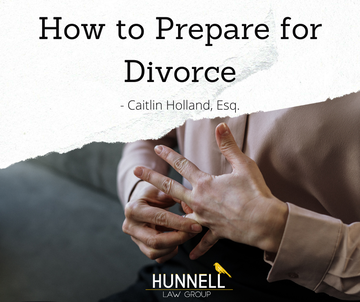|
Divorce is challenging enough, trying to decide how to divide assets and establish a fair amount of support. The last thing you might want to think about is taxes. But it is equally important to understand the tax implications of your decisions (or indecisions), as they can save you from future headaches and financial strain. Here are some essential tax tips to consider: During your divorce you should consider these practical tips: Handle Property Transfers Correctly Transfers of property between spouses as part of the divorce are usually non-taxable events. These types of transfers are generally specified in the Marital Settlement Agreement. However, you must work with your plan provider or real estate attorney to ensure the transfers are handled correctly. Choose the Right Filing Status Your marital status as of December 31st determines your filing status for the entire year. But, even if you’re entitled to file joint, you should still consider whether filing jointly or separately makes better financial sense. If you’re living separate and apart, you may also want to consider whether you file as head of household (instead of married filed separately). Don't Forget About Retirement Accounts Dividing retirement accounts can have tax or other financial consequences, if not properly transferred. For example, you may incur penalties if you liquidate a retirement account, instead of having it transferred directly to your spouse by way of a Qualified Domestic Relations Orders (QDROs). Most important is to ensure the language in your Settlement Agreement regarding how these types of assets are to be transferred is specifically articulated, which should include language that confirms the asset is being transferred through a “tax-free rollover”, for example. After your divorce, these essential tax tips are a must: Update Your Withholding Change in your marital status usually means a change in the tax withholdings outlined on your paycheck. To ensure you have made the correct election, file a new Form W-4 with your employer to reflect your current situation. Real Property Transfers Usually the marital home (or other real property) is transferred post-divorce. When transferring real property in New Jersey, you must be aware that there is a ninety (90) day timeframe to complete the conveyance, if you want to be exempt from the realty transfer tax. Meaning, the Deed must be recorded within 90 days of the divorce being final. Understand Alimony Tax Treatment Alimony and spousal support established after 2018 are not tax-deductible for the payer and are thus not taxable to the recipient. Claiming Dependents The custodial parent generally has the right to claim the child as a dependent. However, we routinely see parents alternating the dependents or if there are more than one, splitting them. In that event, the parties must agree and must file the appropriate form. Please note that these tips are just that, tips and general information. This is not tax advice. What you should do in your situation, depends on the specific facts of your case. Also, keep in mind, most divorce lawyers (HLG included) are not tax lawyers, so if you are unsure what to do, we encourage you to seek professional advice from a tax expert. Tax laws are complex, and getting professional advice can be invaluable during this transitional period.
This blog post published in April 2024 provides a starting point for individuals think about taxes during divorce. Tax laws change overtime, so staying updated is crucial.
0 Comments
 Fighting with Family: Co-Parenting During the Holidays For many, the Holiday Season is full of cheer excitement and love. For others, it’s a time of stress and emotion. For parents who are co-parenting for the first time after a divorce, the Holiday Season can bring about difficult challenges and emotions that are brand new and hard to navigate. Co-Parenting is tough, regardless of the time of year. However, this time of year is especially challenging. Parents are obliged to miss time with their children during the holidays, abandoning family traditions and forced to implement new ones. Arranging time with extended family, going to pageants, concerts, and year-end parties all while navigating this new family arrangement can be overwhelming. Time Sharing The best way to navigate co-parenting during holidays is simply to make sure that you have a plan. If you have advance notice, it’s easier to make arrangements with family and friends, etc. to see your children for the holiday or introduce new family traditions. Your parenting time agreement should implement some form of time sharing for holidays and special days. Some parenting plans even reference Court Holiday Schedules as the default parenting arrangement. The key is to make sure that you have an arrangement in effect for parenting time over the holidays well in advance so that if there are any issues or changes that have to be made, both parents can address them and make their own plans with the children. If your child’s other parent refuses to allow you to see your child over the holidays, you do have options. If you have an agreement that allots specific holiday parenting time and the other parent is not abiding by that agreement, you should consider mediation or counselling. If that is not an option, you may make an application to the Court to enforce that agreement. However, it is important to note that both at Thanksgiving and the week between Christmas and New Year’s Day, the Judges are not all present and, therefore, the Court only hears emergent matters. Emergent applications are made when the issue cannot adequately be addressed within a typical twenty-four day motion period and must be heard immediately. You should contact an attorney to determine whether your case could be considered emergent and heard by the Court during that time. Most holiday parenting time enforcement applications are not emergent. In that case, you will have to file an application with the Court that will not be heard until at least twenty-four days after you file your application. If you do not have a parenting time arrangement that addresses parenting time, you can try to make arrangements on your own in writing, or agree to attend a mediation to establish a holiday parenting time agreement. Again, make sure you give yourself enough time in advance of the holidays, so any issues that have to go before the Court can be resolved in advance of the holidays. If you cannot come to an agreement with your co-parent, then you will have to file an application to establish a parenting time arrangement. Again, this will not typically be considered an emergent action, although you should consult with an attorney if you think it could be. In most cases, it will take that same twenty-four days, at least, for your application to be heard by the Court. Acknowledging the Best Interests of the Child Do not put your child in the middle of any conflict. The best interests of the child is the guiding principle for all family law matters in New Jersey. In all aspects of co-parenting, including time sharing, it is important to remember that you should be serving your child’s best interests, not your own. After you finalize your holiday parenting time arrangement with the other parent, make sure to spend some time talking to your child about what to expect during the holidays and acknowledging and managing their emotions. Try to be flexible with your own expectations. Of course, all parents want to be with their children on Christmas morning, but if that means that you force your spouse to drive through a blizzard to effectuate your parenting time, that’s probably not in the child’s best interest. Likewise, if great-grandma is going to be a Christmas dinner at the other party’s house and great-grandma has been very ill and your child would like to see them, it may be beneficial to your child to see their grandparent. When you do have your child with you for holiday parenting time, make sure you’re cognizant of the conversations happening around your child. Do not let your family and friends disparage the other parent in the presence of your child. If you anticipate your family saying things that could make your child uncomfortable, it may be worth it to have a conversation with your family and friends ahead of time. There’s always next year It is important to remember that this Holiday Season is not be-all and end-all. If something did not work this year, make sure that you address it before next year. If there was a problem that needs to be addressed in mediation or by the Court, make sure to address it sooner than later, so that everything is in effect for next year. If you have any questions or concerns about how to navigate the holidays as a co-parent, visit HunnellLaw.com/contact to request an appointment with an attorney. It’s officially been over a year since the New Jersey Courts have transitioned to virtual proceedings. After months of growing pains, court calendars were scheduled again and virtual hearings became common practice. Unfortunately, many court calendars are still backlogged and running much slower than they did before. This can be bad news for divorcing couples as some judges’ calendars are so backlogged that they are scheduling divorce trials months and months in the future.
It’s commonly known that most divorces settle. The reason for this is that parties usually want control over the terms of their divorce, especially when there are children involved. There are a few different ways to settle a divorce through Alternative Dispute Resolution before it ever gets to trial.
There are many benefits to settling a divorce through ADR, especially right now. First, as previously mentioned, the parties maintain varying levels of control over the terms of their divorce. Second, use of one of the above methods of ADR can significantly decrease the cost of your divorce. Divorces are notoriously expensive – there are so many costs associated with trial that you can avoid should you choose to settle. Third, Courts are governed by case law, statute, court rules and the rules of evidence. If you decide to settle your case there are, generally, more creative solutions that are not strictly bound by Rules and evidence. Fourth, divorce litigation can take a very long time, especially amidst the pandemic. If a divorce is particularly contentious or complicated, there can be weeks of trial dates, whenever the Court can fit them into the calendar. Finally, ADR will almost certainly avoid the high level of conflict that comes with a trial. Divorces are emotionally taxing, but if you are willing to come to the table and compromise it can be beneficial to the parties’ relationship moving forward. Obviously, ADR is not the best choice in every case, but it’s surprising how many contentious divorces can settle if the parties have the right attorneys and are willing to make some compromises. If the parties do not choose to move forward through one of the above-mentioned processes, the court would then schedule trial dates and the parties would move forward with traditional litigation. If the parties are successful in their attempts to settle the case through ADR, they then submit their agreement or the arbitrator’s decision to the Court and appear at an Uncontested Divorce Hearing where the judge signs the Judgment of Divorce. If you are contemplating divorce and would like to speak to an attorney, visit HunnellLaw.com/contact to determine whether ADR may be applicable to your circumstances. Author: Caitlin Holland, Esquire  Whether you are contemplating filing for divorce or you have just been served with divorce papers, you should do some preparation before you hire an attorney or file anything with the court. The items listed below may not be all of the documents you need during the divorce process. Additionally, many of the following items may not be applicable to you, but it is important to compile and organize as much as you can. The clearer the picture, the more effective you and/or your attorney will be. Often, one spouse in the marriage assumes the role of record keeper/accountant. If you do not have access to any of these documents, they may become available through your spouse’s filings or during the divorce process through discovery requests. Generally, you should gather:
Additionally, you should prepare documents for each major area of divorce litigation. There are four major areas addressed in a typical divorce: (1) Equitable Distribution; (2) Spousal Support; (3) Child Support; and (4) Child Custody. Equitable Distribution Equitable distribution is how property is distributed between the parties. Virtually all of the property accumulated during the marriage is subject to equitable distribution, with some exceptions. Therefore, you will need to account for the assets and debts accumulated during the marriage. Assets include real property, retirement accounts, and valuable personal property. Debts include credit card debt, mortgages, student debt, etc. If you or your spouse own a business, you should compile tax documents from the business. Again, if you do not have access to any of these documents, don’t worry! They may become available through your spouse’s filings or during the divorce process through discovery requests. Spousal Support/Alimony The court’s main goal in establishing spousal support is equity and fairness. Alimony is not appropriate in every marriage. In New Jersey, the court will weigh a number of factors in establishing whether alimony is appropriate and, if so, what amount is proper. Some of the factors include the length of the marriage, the income of the parties, each party’s age and ability to work, etc. In establishing an alimony award, it is essential that the court receive a full picture of the parties’ incomes. That means that tax documents including W-2’s, 1099’s, and documentation showing supplemental income from rental properties or dividend payments are important. Child Support Child support in New Jersey is calculated through a formula established by state statute. In order to calculate an appropriate amount of child support, you will need to present information including:
Child Custody There are two forms of custody: Legal Custody and Physical Custody. Legal custody allows parents to participate in major decisions for the child including school, religion, medical decisions, etc. Physical custody is where the child physically resides. In many cases, the child resides with one parent for a majority of the time and the other parent is usually afforded parenting time. It is helpful to keep track of the parenting time exercised during separation or during the divorce process in order to establish a parenting time schedule. When parents cannot agree on parenting time or if there is some reason that custody or parenting time should be limited, you must prepare evidence to prove the limitation is in the best interest of the child. This evidence can include police reports, treatment records, photos, videos, written correspondence between the parties, etc. Again, if you cannot find or do not have access to any of this information, it may become available during the discovery process during your divorce. It is important to remember that even the simplest marriage can end in a complicated divorce. Divorce is a give-and-take process that can be difficult and emotional. However, with the right preparation, you can save your self a lot of frustration. Once you have compiled all of your documentation, it will likely be beneficial to speak to an attorney. If you are contemplating a divorce or have just been served with divorce papers, visit hunnelllaw.com/contact to schedule a strategy session with an attorney at The Hunnell Law Group. By Caitlin Holland, Esq. |
Details
Contributors:Stephanie Hunnell, Esq. , Ryan Westerman, Esq. and Caitlin Holland, Esq. Archives
April 2024
Categories
All
|
|
Hunnell Law Group, LLC is conveniently located at 908 Main Street., Asbury Park, NJ 07712
You can contact us at 732-749-3500 or by facsimile at 732-749-3503 Attorneys serving Asbury Park, Avon-by-the-Sea, Belmar, Manasquan, Bradley Beach, Freehold, Toms River, Fair Haven, Red Bank, Manalapan, Marlboro, New Brunswick, Jackson Township, Brick, Howell, Asbury Park, Ocean Township, Eatontown, Wall Township, Neptune City, Neptune Township, Spring Lake, Wanamassa, Lake Como,
Monmouth County, Ocean County, Middlesex County, and Mercer County, in Central New Jersey. |
© 2019, 2020, 2021, 2022, 2023 Hunnell Law Group, LLC, all rights reserved. Disclaimer & Site Map & Privacy Policy.
No aspect of this advertisement has been approved by the Supreme Court of New Jersey.


 RSS Feed
RSS Feed